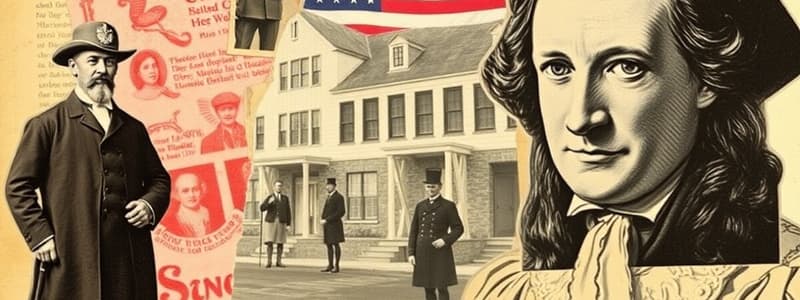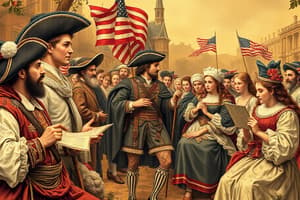Podcast
Questions and Answers
Which amendment abolished slavery in the United States?
Which amendment abolished slavery in the United States?
- 14th Amendment
- 13th Amendment (correct)
- 16th Amendment
- 15th Amendment
The War of 1812 was primarily fought between the United States and France.
The War of 1812 was primarily fought between the United States and France.
False (B)
What was the main purpose of the Freedmen's Bureau?
What was the main purpose of the Freedmen's Bureau?
To assist freed slaves and poor whites in the South by providing education, healthcare, and employment.
The policy of _____ allowed settlers to decide the issue of slavery in their territories.
The policy of _____ allowed settlers to decide the issue of slavery in their territories.
Match the following historical figures with their contributions:
Match the following historical figures with their contributions:
Which document declared the American colonies' independence from British rule?
Which document declared the American colonies' independence from British rule?
The Great Awakening was a period of religious revival in the American colonies.
The Great Awakening was a period of religious revival in the American colonies.
Name one of the individuals who played a significant role in the early women's rights movement.
Name one of the individuals who played a significant role in the early women's rights movement.
The _____ Act of 1649 granted religious freedom to all Christians in Maryland.
The _____ Act of 1649 granted religious freedom to all Christians in Maryland.
What was the primary objective of the Federalist Papers?
What was the primary objective of the Federalist Papers?
Abraham Lincoln was in favor of the Kansas-Nebraska Act.
Abraham Lincoln was in favor of the Kansas-Nebraska Act.
What movement sought to end the institution of slavery in the United States?
What movement sought to end the institution of slavery in the United States?
Flashcards
Mercantilism
Mercantilism
An economic theory emphasizing national wealth through a favorable balance of trade; colonies were expected to provide raw materials and serve as markets for manufactured goods.
Religious Toleration
Religious Toleration
The principle of allowing freedom of religious practice, often within specific boundaries.
Acts of Trade & Navigation
Acts of Trade & Navigation
A series of laws enacted by the British Parliament to regulate colonial trade, aiming to generate revenue and enforce mercantilist principles.
Stamp Act
Stamp Act
Signup and view all the flashcards
Stamp Act Congress
Stamp Act Congress
Signup and view all the flashcards
Declaration of Independence
Declaration of Independence
Signup and view all the flashcards
Intolerable or Coercive Acts
Intolerable or Coercive Acts
Signup and view all the flashcards
Constitutional Convention, 1787
Constitutional Convention, 1787
Signup and view all the flashcards
Social Darwinism
Social Darwinism
Signup and view all the flashcards
Social Gospel
Social Gospel
Signup and view all the flashcards
Populist Party
Populist Party
Signup and view all the flashcards
Gilded Age
Gilded Age
Signup and view all the flashcards
Laissez-faire
Laissez-faire
Signup and view all the flashcards
Study Notes
People and Events
- John Smith: Included in the list of people, but no further detail provided.
- John Winthrop: Included in the list of people, but no further detail provided.
- Jonathan Edwards: Included in the list of people, but no further detail provided.
- Anne Hutchinson: Included in the list of people, but no further detail provided.
- Roger Williams: Included in the list of people, but no further detail provided.
- William Bradford: Included in the list of people, but no further detail provided.
- George Whitefield: Included in the list of people, but no further detail provided.
- James Oglethorpe: Included in the list of people, but no further detail provided.
- John Peter Zenger: Included in the list of people, but no further detail provided.
- Separatists: Included in the list of people, but no further detail provided.
- Pilgrims: Included in the list of people, but no further detail provided.
- George Washington: Included in the list of people, but no further detail provided.
- Thomas Paine: Included in the list of people, but no further detail provided.
- Samuel Adams: Included in the list of people, but no further detail provided.
- Thomas Jefferson: Included in the list of people, but no further detail provided.
- John Paul Jones: Included in the list of people, but no further detail provided.
- John Hancock: Included in the list of people, but no further detail provided.
- John Adams: Included in the list of people, but no further detail provided.
- Charles Townshend: Included in the list of people, but no further detail provided.
- Alexander Hamilton: Included in the list of people, but no further detail provided.
- John Locke: Included in the list of people, but no further detail provided.
- Benjamin Franklin: Included in the list of people, but no further detail provided.
- John Marshall: Included in the list of people, but no further detail provided.
- Henry Clay: Included in the list of people, but no further detail provided.
- John C. Calhoun: Included in the list of people, but no further detail provided.
- Andrew Jackson: Included in the list of people, but no further detail provided.
- Elizabeth Blackwell: Included in the list of people, but no further detail provided.
- Emma Willard & Catherine Beecher: Included in the list of people, but no further detail provided.
- Frederick Jackson Turner: Included in the list of people, but no further detail provided.
- Ralph Waldo Emerson: Included in the list of people, but no further detail provided.
- Henry David Thoreau: Included in the list of people, but no further detail provided.
- James Polk: Included in the list of people, but no further detail provided.
- John Slidell: Included in the list of people, but no further detail provided.
- Founding Fathers: Included in the list, but no further detail provided.
- Federalists: Included in the list, but no further detail provided.
- Dem-Republicans: Included in the list, but no further detail provided.
- Whigs: Included in the list, but no further detail provided.
- Lewis & Clark: Included in the list, but no further detail provided.
- Nathan Hale: Included in the list, but no further detail provided.
- Charles G. Finney: Included in the list, but no further detail provided.
- Frederick Douglass: Included in the list, but no further detail provided.
- John Brown: Included in the list, but no further detail provided.
- Abraham Lincoln: Included in the list, but no further detail provided.
- Stephen Douglas: Included in the list, but no further detail provided.
- Jefferson Davis: Included in the list, but no further detail provided.
Terms
- mercantilism: Economic policy in which a nation sought to export more than it imported to maximize wealth.
- favorable balance of trade: A nation exporting more goods than it imports.
- tobacco: Important cash crop in colonial America, often associated with trading practices.
- slavery in Colonial America: Human enslavement was deeply entrenched in the colonial economy.
- Toleration Act of 1649: Facilitated religious tolerance in specific colonies.
- Enlightenment in Colonies: Philosophical movement with impacts on colonists' thinking.
- Great Awakening: Religious revival movement within colonial America.
- religious toleration: Acceptance of different religious beliefs within a given area.
- Acts of Trade & Navigation: British laws to control trade and commerce with the colonies.
- Stamp Act: Tax on paper goods imposed by Britain on the colonies.
- Stamp Act Congress: Colonial response to the Stamp Act, highlighting grievances.
- Townshend duties, 1767: Tax on British imports to the colonists.
- Tea Act, 1773: Granted the British East India Company a monopoly on tea sales.
- Boston Tea party: Protest against the Tea Act, with colonists throwing tea into the Boston Harbor.
- Intolerable or Coercive Acts: Punitive British measures in response to the Boston Tea Party.
- First Continental Congress: Meeting of colonial delegates to unify against British actions.
- Second Continental Congress: Declared independence from Britain and formed a government.
- Dec. of independence: Formal declaration of separation from Britain.
- Treaty of Paris, 1783: Ended the American Revolution, giving the US independence.
- Annapolis Conference, 1786: Early attempt to address issues of state relations and interstate commerce.
- Land Ordinance, 1785: Managed the sale of land in the Northwest Territory.
- Northwest Ordinance, 1787: Established procedures for creating new states from the Northwest Territory.
- Federalist Papers: Series of essays advocating for ratification of the Constitution.
- Constitutional Convention, 1787: Convention where the US Constitution was drafted.
- National Bank: Institution to manage the financial operations of the nation.
- Kentucky & Virginia Resolutions: Documents advocating for states' rights.
- XYZ Affair: Diplomatic dispute with France.
- Alien & Sedition Acts: Legislation restricting immigrants and speech in the early Republic.
- Midnight Judges appointments: Judiciary appointments made right before a new government took office.
- Judiciary Act, 1789: Established the federal judiciary structure.
- Second Great Awakening, 1800's: Religious revival movement in the early 19th century.
- Embargo Act, 1807: Restrictions on US exports to try to stop issues with Britain and France.
- War Hawks: People who strongly supported war with Britain.
- Treaty of Ghent, 1814: Ended the War of 1812.
- Rush-Bagot Agreement: Agreement limiting military forces on the US and Canadian border.
Ideas and Concepts
- Characteristics of 1st Eng. settlements: Early English settlements had specific characteristics.
- Beliefs/characteristics of Slavery: Specific beliefs related to the institution of slavery.
- Puritans: Religious group with certain beliefs and practices, in colonial America.
- Virginia: An early English colony with specific characteristics, in colonial America.
- Constitution: Document explaining the principles governing the US's laws.
- Salen Witch Trials: Historical event with specific characteristics, in colonial America.
- education in colonial Am.: Aspects of education in the colonial era.
- major parts of the Declaration of Independence: Various components of the formal declaration.
- deletions: Removal/omission of information associated with the Declaration of Independence.
- American War aims in Rev.: Specific goals in the American Revolutionary War.
- Articles of Confederation: Document governing the states after independence.
- strengths: Specific positive attributes of the Articles of Confederation.
- weaknesses: Specific negative issues with the Articles of Confederation.
- Constitutional Convention: Event where the US Constitution was developed.
- Bill of Rights: First 10 amendments to the US Constitution.
Studying That Suits You
Use AI to generate personalized quizzes and flashcards to suit your learning preferences.




